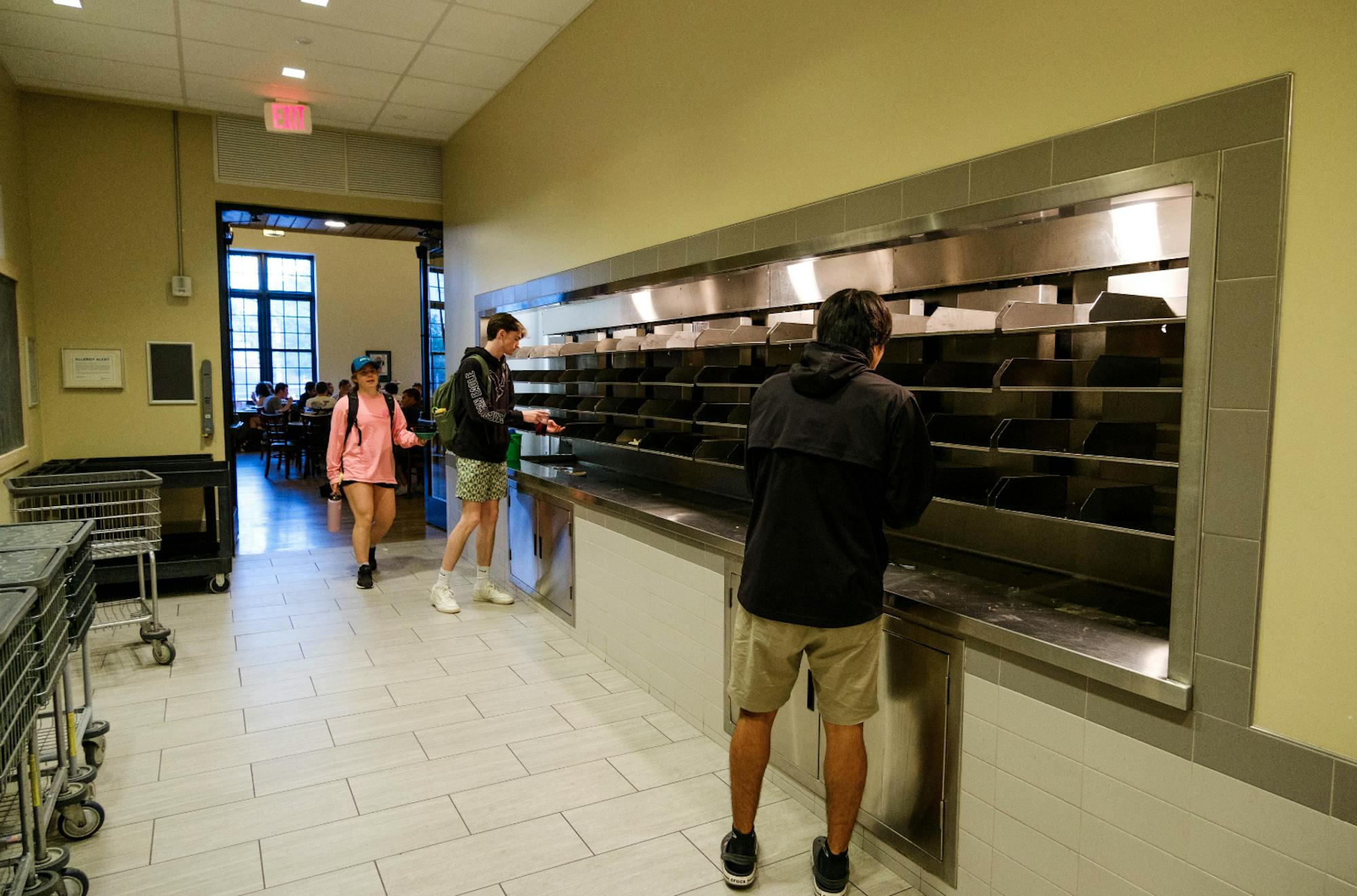Every day, students who dine in the Class of 1953 Commons drop their dirty dishes off on the conveyor belt, which leads to the dish room. To students, the belt makes it seem like leftover food and dirty dishes simply disappear. However, employees of Dartmouth Dining Services explained how they deal with high water use and food waste and as they consider ways to make dining on campus more sustainable.
The dishwasher, for example, runs for 15 hours every day, according to ’53 Commons general manager Brandon Crosby. The amount of water used in this process and composting large amounts of leftover food brings the issue of sustainability to the forefront, Crosby said.
As part of their efforts to make ’53 Commons more sustainable, Dartmouth Dining Services utilizes green chemicals — chemicals that reduce pollution through hazard-free substances — in their dishwashing process to clean the dishes. Although they may be less effective at cleaning, they are better for the environment, Crosby said. The dish washer also regulates its temperature to optimize minimal use of hot water, he added.
“I want to teach people now the importance of being good stewards of the Earth. The little things that you do, as students here at Dartmouth, have a big impact,” Crosby said.
Crosby said one way students can incorporate sustainability practices into their daily lives is by being mindful of how much food they think they’re going to eat before filling their plate.
“I very much want to make sure that [the students] have all the food they want to eat, but it pains me to see how much food is brought to the dish room,” Crosby said. “What we learn from a sustainability standpoint and waste consciousness point is learning to eat what you take and go back if you want more.”
Some students, including Orlando Fernandez ’26, work “behind the wall” cleaning dishes. The workers who aren’t Dartmouth students are often temporary workers bused in from Concord in the morning, according to Dolloff.
Fernandez said he thinks that the treatment of food at ’53 Commons is part of a “larger culture” of “an intrinsic habit of privilege.”
“You see dishes with about seven pieces of pizza that people just throw away,” Fernandez said. “A lot of the people at Dartmouth won’t ever work in a place like this. They’ve never had to face food scarcity in any way, so their relationship to food is very negligent. It’s a commodity which they always have taken for granted.”
Fernandez said that an important way that the school engages in sustainability efforts is by donating leftover food to the Upper Valley Haven, which provides food and shelter for those in need in the Upper Valley.
Alexander Jones ’23 also expressed concerns about food waste.
“I try not to waste too much,” Jones said. “I feel like I don’t usually throw away that much of my food, but I definitely think it is wasteful when people take a lot of food and put most of it on the conveyor belt.”
Crosby said he is talking with students about organizing a reusable cup program, saying that student effort is key to the success of sustainability efforts. He cited the Green2Go program as an example of the success of student engagement in past DDS reusability programs.
“Our Green2Go program is phenomenal, and it’s improved in the five years I’ve been here,” he said. “But it’s all been student-driven — all of the changes, all of the things that make it successful are because it’s a student-led initiative.”
Manager Holly Dolloff said that she “absolutely” sees food go to waste working behind the dish carousel, estimating that she alone composts “close to 100” pounds of food every shift.
“Kids are just kids,” Dolloff said. “They still have a lot of food on those plates when we get them. What can we do? I can’t sit there and force a kid to eat.”
Although Dartmouth isn’t a “zero-waste school,” unlike the University of New Hampshire, Crosby said that he wants to develop processes to make Dartmouth Dining Services better for the environment. This means changing the way the school deals with some waste, including buying an eco shredder to dispose of paper goods.
Crosby said that some future initiatives could look like UNH’s agricultural program, which partners with farms to process and compost leftover food. The food from ’53 Commons is donated to Dartmouth’s Organic Farm in small portions, but their needs aren’t extensive enough to process all the food. Instead, most of it is composted and used to cover landfill, Crosby said.
Despite his concerns about waste, Fernandez said he enjoys working in the dishroom. The best part, he said, is the pro-complaint decoration.
“I love the signs,” he said. “There’s one that says, ‘Every time you complain, God adds a year of life to you.’”
Charlotte Hampton is the editor-in-chief of The Dartmouth. She hails from New York, N.Y., and is studying government and philosophy at the College.
She can be reached at editor@thedartmouth.com.




